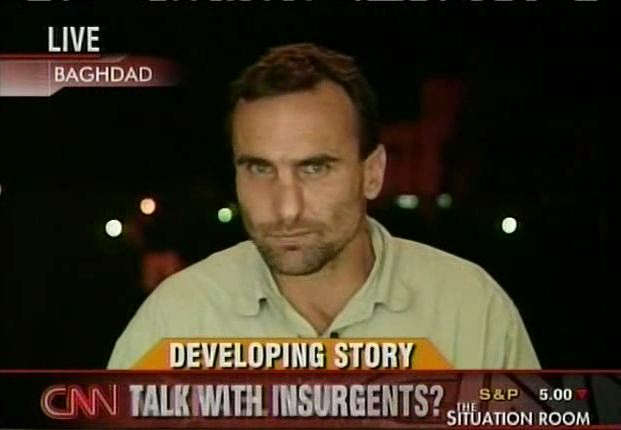TSR: White House response

Click photo to play
Length: 3:16
WOLF BLITZER: Car bombs, mortars and rockets are adding to the carnage in Baghdad today. Dozens of fresh casualties are reported there and police say they found dozens more bullet-riddled bodies on the streets of the capital.
Should the U.S. be talking with insurgents right now?
CNN's Michael Ware is joining us once again from Baghdad -- Michael, thanks very much.
You had a fascinating report on these insurgents now suggesting that they would like to enter into direct talks with the Bush administration.
Listen to the White House press secretary, Tony Snow. He responded to that earlier today.
(BEGIN VIDEO CLIP)
TONY SNOW, WHITE HOUSE PRESS SECRETARY: There are two things insurgent leaders don't want. They don't want you to know who they are and they don't want you to know where they live.
Under such circumstances, it's very difficult to have regular meetings with them. So what you really have here is a situation in which the Iraqis have their own way of communicating, sometimes through third parties. But let's reiterate, reconciliation is a key part of what the prime minister is trying to do.
(END VIDEO CLIP)
BLITZER: He's referring to the Iraqi prime minister, Nouri al-Maliki.
What do you make of that White House reaction to your exclusive reports?
MICHAEL WARE, CNN CORRESPONDENT: Well, Wolf, I mean it's a stated fact, as we've heard from the U.S. ambassador himself, Zalman Khalilzad, that the United States has had dialogues, contact, communication, back channel flows with the Sunni insurgency.
What they've been targeting from the beginning, certainly since the end of the Bremer administration and the arrival of Ambassador John Negroponte as the U.S. representative here in Baghdad, is to reach out primarily to the old Baath apparatus that Bremer's administration so rapidly dismantled after the war.
That conversation continues. However, the Baathists and the insurgents out there are disillusioned with what they see as a less than genuine U.S. response -- Wolf.
BLITZER: What about Maliki, the prime minister? Is he feeling any heat from the U.S. government, the Bush administration, members of Congress to start dealing with these death squads, these militias? Or is he resisting that pressure?
WARE: Well, Wolf, obviously, all of this is conducted behind closed doors and on secure phone communications.
However, I think it's very clear from what little there has that's fallen from the table publicly, the crumbs that we can piece together, that, yes, there clearly is pressure.
Look at Secretary Rice's language when she visited most recently in Baghdad. It was very much tougher talk than we've seen on her previous visit back in April.
The U.S. needs to see change and they need to see it now. They need to see the Baghdad security plan working. And, quite frankly, it's stalled. They need to see Nouri al-Maliki, the last possible hope they might have for the democratic model here, the man they've invested so much in, succeed.
Yet what is he doing?
He's refused to dismantle the militias and according to an interview with one U.S. paper, he's preventing U.S. forces from going into the heart of the capital, where the largest militia comes from -- Wolf.
BLITZER: And that would be Sadr City.
Michael Ware reporting for us.
Thanks very much.
